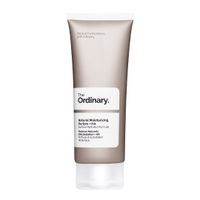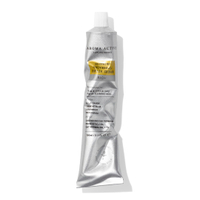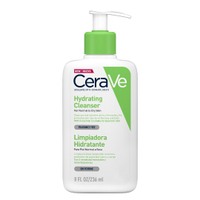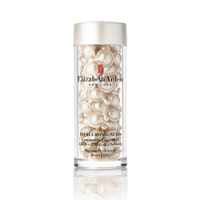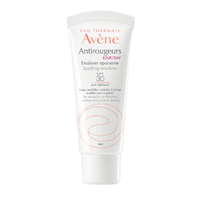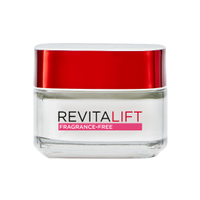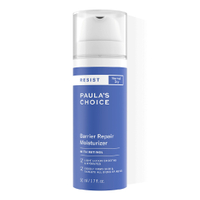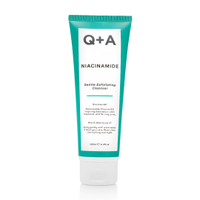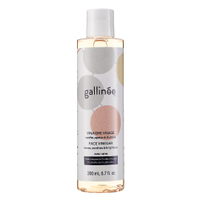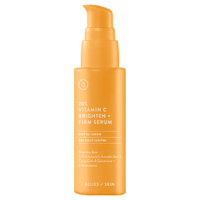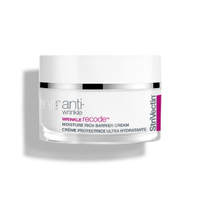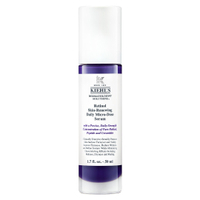Skin barrier 101—what is it, how to spot damage and the best products to repair it
Everything you need to know about looking after your skin barrier, aka the skin’s frontline defense


The 'skin barrier' doesn't often get the airtime it deserves. It doesn't have the gravitas of wrinkles and crow's feet; it doesn't seem quite as news-worthy as pigmentation, and it's certainly not as sexy as the quest for a radiant glow.
But between the growing popularity of plant-based diets and the appetite for clean beauty products free from harmful chemicals, it seems we are more conscious than ever of what we put into and on to our bodies. We are no longer satisfied by quick-fix tricks like wrinkle fillers and chemical peels (although they still have their place in our anti-ageing arsenal), and even the best foundation can only do so much to temporarily improve the tone and texture of your complexion.
If you want your skin to look its best outwardly, we need to look inward, at possibly the most important part of our skincare routine and the biggest contributing factor to our skin’s overall health—the skin barrier. Not heard of it? Allow us to break down that barrier for you.
What is the skin barrier?
Dermatologically-speaking, your skin barrier (aka moisture barrier/lipid barrier/stratum corneum—this thing has more names than Prince!) is the outermost layer of the epidermis. It’s also the bit that we see so aesthetically-speaking, it’s vital we take care of it. Most importantly, it’s responsible for keeping the good stuff sealed in, and the bad stuff locked out. Think of it like an invisible shield, keeping irritants at bay.
“Our skin barrier works as a protectant and if it becomes damaged this may allow external aggressors, irritants and allergens to penetrate the skin and cause issues such as skin sensitivity and dermatitis,” explains consultant dermatologist, Dr Alexis Granite. You could apply the best, most hydrating cream in the world, but if your moisture barrier is compromised, then your skin will not retain water (known as trans epidermal water loss), and that can lead to all sorts of trouble. Rough, dull, flaky, red skin are all outward signs that your skin barrier might not be functioning as it should. And a damaged moisture barrier also makes it more difficult to repair and reverse signs of ageing.
What affects the skin barrier?
1. Seasonal extremes
Between bracing winds, bitter temperatures and central heating, our skin takes a seasonal beating during the winter months. This constant flux in temperature can damage our protective barrier, so skin feels more irritable and is more prone to flushing.
2. Harsh ingredients
Harsh cleansers, soap bars and skincare with alcohol and fragrance will contribute to a damaged skin barrier. Overdoing it on the active ingredients won’t help either so go easy on the use of AHAs, BHAs and retinol. According to Cerave’s Global Skin Cleansing Survey, 31% of the people they quizzed spoke about their skin feeling “squeaky clean” after cleansing, but this can be a distress signal for a barrier not functioning properly.
Sign up for the woman&home newsletter
Sign up to our free daily email for the latest royal and entertainment news, interesting opinion, expert advice on styling and beauty trends, and no-nonsense guides to the health and wellness questions you want answered.
3. Hot water
As tempting as it is to cleanse with a steaming washcloth and soak in a bubble bath so warm it turns your skin a brighter shade of lobster, it will strip the skin’s natural oils and damage the moisture barrier, leaving your skin feeling dry, tight and generally irritable. Stick with lukewarm water to cleanse your skin.
4. Over-exfoliation
One of the biggest culprits of a damaged skin barrier is excessive exfoliation and using abrasive scrubs to perform it. However satisfyingly scrubby they may feel, a scratchy physical exfoliator (one with beads, rather than a leave-on chemical exfoliant) can cause teeny-tiny micro tears in the skin.
5. UV exposure
The sun’s rays disrupt the skin barrier function, which in turn makes the skin more susceptible to sun damage. Even worse, when the barrier is compromised, your sunscreen won’t bind as well to the skin, so you’re even less protected—it’s a vicious circle. Wear a broad spectrum (meaning it protects against both UVA and UVB rays) sunscreen in SPF30 or higher. Choose one with antioxidants to protect the moisture barrier against free radical damage.
What are the signs of a damaged skin barrier?
Your skin is one clever organ and will alert you to a barrier SOS. Healthy skin should look smooth, soft, and hydrated, but with a compromised moisture barrier your face may feel dry and scaly and look dull and lackluster. You may experience increased sensitivity, inflammation, and itchiness.
In the colder months, it’s normal to expect some flushing, but if the redness is ongoing, it’s likely you’re experiencing seasonal irritation and may be a sign of a damaged skin barrier. Another clear warning sign is a stinging, burning sensation when applying even simple cleansers, serums and creams.
How can we repair the skin barrier?
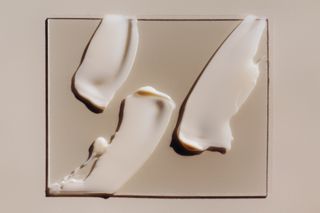
Before you declare your skin barrier a total write-off, be buoyed by the fact that the damage is repairable. First of all, strip your routine right back. Ditch the abrasive scrubs and active acids, which will strip the top layers of skin and disturb the skin’s pH balance, and give your skin a couple of weeks off. Cleanser, SPF, a simple serum and moisturiser is all you need while you detox.
Look for skincare with repairing ingredients such as fatty acids, and in particular, linoleic acid found in oils like sunflower oil. This omega 6 fatty acid is not only an A star moisturiser but helps to boost barrier function. These sorts of ingredients are often included in thick moisturizers known as barrier creams. So if you were wondering what is barrier cream, now you know - and the good news is, your skin can never have too much of it!
Dr Dendy Engelman, Elizbeth Arden’s Cosmetic Dermatologist, says ceramides are the answer to a healthy skin barrier. ‘These fatty acids make up the essential building blocks of our skin and help skin retain moisture. Without them we would be exposed to bacteria, viruses and other environmental assaults.’ You can think of ceramides as the cement, holding the bricks of our skin barrier together. Look for skincare with niacinamide, which stimulates ceramide production to get your barrier into good shape.
‘Focusing on hydration is key,’ adds Deciem’s Chief Scientific Officer, Prudvi Kaka. ‘The best ingredients for hydration will be those that have a positive impact on the stratum corneum, to ensure skin integrity and hydration, as well as preventing water loss.’ Hyaluronic acid is one such ingredient, acting like a magnet for water molecules to plump up skin at the surface.
Let’s also touch on bacteria. Sounds gross, right? Human skin has 1 million microbiomes per square centimetre and is a crucial component of our skin barrier. By balancing and nourishing these living microbes with pre and probiotic skincare, you can bolster barrier function and restore healthy, happy, glowy skin.
Once your barrier-boosting regime is underway, turn your attention to protection. Antioxidants like vitamins A (look out for the best retinol cream), C and E will help support a strong skin barrier and defend against free radical damage.
12 skin barrier boosting buys
Elizabeth Arden Hyaluronic Acid Ceramide Capsule Hydra-Plumping Serum | RRP £45 for 30
When dry, sunken skin needs a plumping hit, try these clever capsules. Hyaluronic acid and ceramides work in tandem to draw moisture in then lock it down. The vial delivery system ensures the ingredients remain fresh, potent and perfectly dosed.
Paula’s Choice Resist Anti-Aging Barrier Repair Moisturiser | RRP £34
Squalane is another barrier booster, loaded with fatty acids and protective antioxidants—tick, tick! Cocktailed here with retinol and adenosine, a yeast-derived ingredient with mega soothing properties, this is the perfect night cream for dry skin.
Q+A Niacinamide Exfoliating Cleanser | RRP £7.50
For red, stressed and blemished skin, this gentle yet effective cleanser restores calm and balance. Niacinamide builds up weakened skin barriers, aloe vera provides the antioxidant protection, while inulin and fructose are the dynamic duo responsible for improving conditions for the friendly microbes on the skin.
Gallinée Face Vinegar | RRP £23
This is like plant food for your microbiome, giving those good guys the perfect environment to thrive and deal with daily aggressors. The result is smoother, softer and less reactive skin. Splash on to a cotton pad and sweep over skin twice a day, before you move on to serum and moisturiser.
Allies of Skin 20% Vitamin C Brighten + Firm Serum | RRP £85
The best vitamin C serums improve tone, texture and overall skin health. This is no exception—in fact, it’s one of our faves, packed with 20% L-ascorbic acid, the most stable and beneficial form of vitamin C. In this form, it’s better able to penetrate the skin barrier and start working its illuminating magic.
Kiehl’s Retinol Skin-Renewing Daily Micro-Dose Serum | RRP £62
Retinol is a bit of a dirty word for sensitive skin. We get it. It is unequivocally effective in boosting cell turnover which can help with everything from acne to pigmentation. But the speed at which it achieves this can bring with it irritation and discomfort for many. This smart serum has overcome this hurdle with a gentle slow-release formula. We’ve seen the before and after shots, and trust us, this stuff works. Still, make sure you read our guide on how to use retinol safely before steaming ahead.
Stephanie Maylor is a Beauty Editor working across five national magazine titles, with almost 15 years' experience in the industry. She has written for many brands, including woman&home, Grazia, Now, More!, Fabulous, NW, Woman, Woman's Own, Woman's Weekly, Essentials, Best, Chat, and OK! online.
In 2010 she launched her own beauty blog, which was shortlisted for Best Beauty Blog in the 2011 and 2012 Johnson & Johnson Beauty Journalism Awards. She has interviewed many high profile industry experts and celebrities including Alesha Dixon, Twiggy and Christina Hendricks.
-
 Where was The Gentlemen filmed? The historic locations that stood in for Halstead Manor
Where was The Gentlemen filmed? The historic locations that stood in for Halstead ManorThe Gentlemen's filming locations include several historic homes and a private members' club and they're all spectacular
By Emma Shacklock Published
-
 "I was a bit nervous about wearing a waistcoat" - Denise Van Outen shares her top tip on styling one of this spring's biggest trends
"I was a bit nervous about wearing a waistcoat" - Denise Van Outen shares her top tip on styling one of this spring's biggest trendsHow to wear a waistcoat in a way that works for you
By Caroline Parr Published
